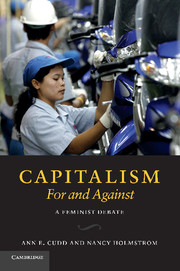3 - Ann Cudd's reply to Nancy Holmstrom
Published online by Cambridge University Press: 05 June 2012
Summary
Professor holmstrom and i agree on many things. We agree that poverty is a serious problem, and that the wealthier persons of the world should do more to alleviate it. We agree that women are overrepresented among the poorest of the world, and that in many places women suffer from severe oppression. We also agree that philosophers and economists have in the past largely failed to attend sufficiently to the concerns of the poor, the sick, and the vulnerable, and, until recently, have virtually ignored women. What we disagree on, for the most part, is the best means of ending poverty and oppression. Where I see capitalism as an essential means to that end, she sees it as an inevitable obstacle to progress. Part of our disagreement hinges on the conception of freedom and human well-being. But we both also agree that neither material goods nor freedom are incommensurable; they permit tradeoffs, though we might disagree on how those tradeoffs are to be made.
Our main disagreement, however, is over the economics of poverty and well-being. By “economics” I mean two things. First, is the economic theory that should be applied in the debate. Professor Holmstrom accepts a Marxist theory of production and wages, which I maintain is outdated and false. I accept a neoclassical account of wage and price determination, which she rejects as ideological and naive.
- Type
- Chapter
- Information
- Capitalism, For and AgainstA Feminist Debate, pp. 263 - 288Publisher: Cambridge University PressPrint publication year: 2011

